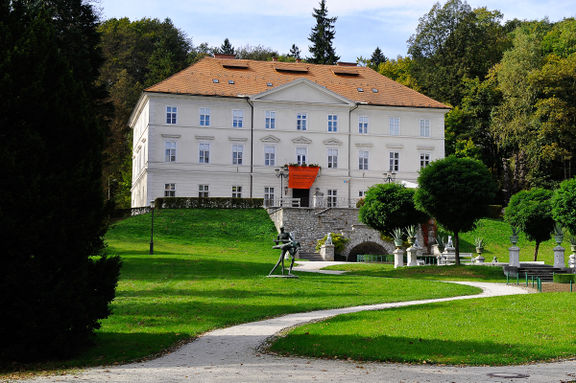Difference between revisions of "Tivoli Mansion"
m |
m (Heritage maintainer) |
||
| Line 1: | Line 1: | ||
{{Article | {{Article | ||
| status = ROBOT WRITING TOPROOFREAD NIFERTIK! | | status = ROBOT WRITING TOPROOFREAD NIFERTIK! | ||
| − | | maintainer = | + | | maintainer = Heritage maintainer |
}} | }} | ||
{{Infobox | {{Infobox | ||
| Line 25: | Line 25: | ||
Situated in the very heart of Tivoli Park, [[Tivoli Mansion]] was erected at the beginning of the 17th century by the Jesuit order on the site of the Podturn, a 15th-century fortified residence built by Baron Apfaltrer. Following the dissolution of the Jesuits in 1773 the mansion became firstly the summer residence of the Bishop of Ljubljana, and later the property of the Provincial States. In 1835 the Ljubljana Kazina Society opened a summer amusement park here with an adjacent pub and café. It was then that the mansion was given its present name. In 1852 it was bought by the Emperor Franz Joseph and let on a lifelong lease to Austrian Field Marshal Joseph Radetzky, who gave it its present appearance. At this time the façade was redecorated in Classicist style and a number of new walking paths and gardens were opened to the public. In 1865 Tivoli Mansion was purchased by the Municipality of Ljubljana and subsequently a pool with a fountain and a stairway decorated with tongueless dog statues were built in front of it. The dog statues were created by the sculptor Anton D Fernkorn in around the year 1870. Thereafter until 1967 Tivoli Mansion was a residential building. In recent years it has been completely renovated and now houses the [[International Centre of Graphic Arts, Ljubljana]], organisers of the [[Ljubljana International Biennial of Graphic Art]]. | Situated in the very heart of Tivoli Park, [[Tivoli Mansion]] was erected at the beginning of the 17th century by the Jesuit order on the site of the Podturn, a 15th-century fortified residence built by Baron Apfaltrer. Following the dissolution of the Jesuits in 1773 the mansion became firstly the summer residence of the Bishop of Ljubljana, and later the property of the Provincial States. In 1835 the Ljubljana Kazina Society opened a summer amusement park here with an adjacent pub and café. It was then that the mansion was given its present name. In 1852 it was bought by the Emperor Franz Joseph and let on a lifelong lease to Austrian Field Marshal Joseph Radetzky, who gave it its present appearance. At this time the façade was redecorated in Classicist style and a number of new walking paths and gardens were opened to the public. In 1865 Tivoli Mansion was purchased by the Municipality of Ljubljana and subsequently a pool with a fountain and a stairway decorated with tongueless dog statues were built in front of it. The dog statues were created by the sculptor Anton D Fernkorn in around the year 1870. Thereafter until 1967 Tivoli Mansion was a residential building. In recent years it has been completely renovated and now houses the [[International Centre of Graphic Arts, Ljubljana]], organisers of the [[Ljubljana International Biennial of Graphic Art]]. | ||
}} | }} | ||
| − | |||
| − | |||
| − | |||
| − | |||
== See also == | == See also == | ||
*[[International Centre of Graphic Arts, Ljubljana]] | *[[International Centre of Graphic Arts, Ljubljana]] | ||
*[[Ljubljana International Biennial of Graphic Art]] | *[[Ljubljana International Biennial of Graphic Art]] | ||
| − | |||
== External links == | == External links == | ||
Revision as of 15:46, 4 May 2010
See also
External links
- International Centre of Graphic Arts (MGLC) website (in English)



